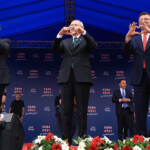“Kemalism could not change the path of the main stream. Now we’re back where we were, and Kemalism is no longer an alternative. Now (for an uncertain period of time) politics, socialization and culture will advance on the ground of ‘New Unionism’.”
We had run out of sugar at home, so we went and bought it from the nearby grocery store. The brand of the candy: ‘Last Ottoman’. Using this name for a one-pound package of granulated sugar must have been seen as a creative marketing move. A name that would have seemed absurd ten years ago, a name that could not come together with the habits of the modern and urban consumer, now smiles at passersby from a package of granulated sugar.
The cultural context has changed so much in Turkey that the majority no longer ask, ‘is there such a sugar brand?’ We are no longer in the globalist world of liberalism. Instead, we are in the local and nationalist world of the ‘NewUnionism’.
Think about it. Even the packaged granulated sugar has been adapted to this. People are already in this new world and continue with life probably feeling more ‘at home’.
This situation points to a historical-ideological phenomenon too deep to be reduced to the success of power: Kemalism and the self-identity-citizenship trilogy it brought were actually strangers to this country.
Today, following the failed —and permitted by the regime—coup attempt of 2016, Kemalism has been dragged into the periphery of politics as a “sweet memory” for the secular community.
This is the reason why Mustafa Kemal [Atatürk] stands out as a glorified figure. He is the sole symbol left from Kemalism, and can be carried into the future. As a matter of fact, the cult of personality is also very suitable for the New Unionism, and finally it has been established that Mustafa Kemal was essentially a Unionist…
In fact, so to speak, he was the ‘Last Ottoman.’
Although it has not yet completed a decade, the New Unionism is about to transform the first hundred years of the Republic into an ideological parenthesis: Kemalism was just the name of a transition period; now we are going back to ‘Unionism’. Not as a repeat of a hundred-odd years ago, but by trying to be compatible with the global dynamics and technological opportunities suitable for today’s world.
It is useful for those who look to the future, especially those who conduct politics, to realize the mental and psychological shift we are experiencing. However, first I have to talk about a misconception we have had in the past.
In my youth, Kemalists persistently promised that the Republic was a ‘rupture from the past’ and that the Ottoman book was closed from every angle by Kemalism. As the libertarian left/democratic intellectuals of the time, we would feel the need to voice our reservations, and we would add detail and nuance to the issue in question.
We knew that continuity and rupture would not necessarily be separated from each other, that Kemalism was only a part of the process, and that the dynamic of continuity better explained what was happening in Turkey. The new Republican regime not only embraced the thinkers, bureaucrats and some capitalists of the Unionists, but it also adopted the logic of unionist recruitments and ways of doing business, internalized the understanding of politics and its value system.
As a matter of fact, the new regime, which presented itself as morally ‘different’, finally and proudly claimed ownership of the ‘Special Organization’ [Teşkilat-ı Mahsusa, a former branch of the secret service]. Reducing politics to a single-party oppression, integrating the party into the state, accumulating power in the center, confiscating the property of its own citizens, while maintaining the ‘logic of looting” discreetly, were the easily recognizable features of the new regime.
We focused on this dimension. We concluded that the continuity from the Ottoman Empire to the Republic was far more decisive than the ‘break’.
What we had observed was true, but it turned out that it had a superficial side: we had put too much weight on the issue of citizenship. Rights, freedoms, equal opportunity, the functioning of the public sphere were of primary value for us. In other words, we cared about politics and determined that Kemalist politics did not move far from ‘Unionist’ politics, and even integrated with it.
Why did we care about politics? Because we had all gone through ‘modern’ education and had identified with modernity. Our misconception was not to realize that politics itself is superficial in this country.
We had thought that politics was the basis of social relations. However, in this country, politics is just a surfboard that fluctuates over other sensitivities. Especially in transitional periods.
Kemalism also has a share in this misconception. This new regime also defined Turkey as ‘modern’ and therefore saw politics as the main dynamic that would carry the country into the future. Maybe it dreamed that people would now be liberated of their concerns and start looking at themselves as ‘citizens’.
But it didn’t happen. Kemalism could not change the path of the mainstream. Now we’re back where we were, and Kemalism is no longer an alternative. Now (for an uncertain period of time) politics, socialization and culturalization will advance on the ground of ‘New Unionism.’
In order to explain this clearly, I would like to present once again the suggestions of Kemalism and ‘New Unionism’ that I referenced in my previous articles:
Kemalism:
- An understanding of the state as a dominant force, the guide of society, thinking and making decisions on its behalf and for its benefit.
- An encompassing ‘individual nationalism’ (to those who try to crush all ethnic identities except Turkishness).
- A strict secularism that excludes religiosity from the public sphere.
- The desire to be a part of the Western world and be accepted by it.
- A foreign policy that aims to be content with the geographical position (‘the land in its hands’) and protects it (‘peace at home, peace in the world’).
New Unionism:
- A feeling that Turkishness and Islam have been met by injustices and its rights should be taken back, and fed by an expansionist impulse to do so.
- A hostility to the West that feeds on the West as the eternal adversary, from the belief that its purpose is to eliminate Turkish existence.
- A secularism that unleashes/liberates piousness in daily life and allows all kinds of Muslim belief systems as natural, but ‘non-political’;
- A nationalism that uses Turkish identity as an exclusionary criterion, intolerant to other ethnic identities, but embraces Sunni Islam;
- A state that is dominating, guiding society, thinking and making decisions on its behalf and for its benefit.
When we consider these two parts together, we at least sense that ‘New Unionism’ suggests a different order of priorities, not just different propositions from each other. Kemalism’s modernist approach toward ‘citizenship-identity-self’ becomes, under New Unionism, a kind of post-imperial emotional search and self-realization, in which the order of priorities is ‘self-identity-citizenship.’
The order of priorities in Kemalism takes the form of politics-ideology-psychology. When you establish politics, the people become ideologically aligned, and it is hoped that they will develop a psychology that will support the regime.
In the New Unionism, the ranking is reverse: Psychology-ideology-politics. When you catch the people through the right psychology, it shifts towards the ideology you propose and adapts to your politics spontaneously.
The New Unionism expresses a return to the issue of self that Turkey has never been able to resolve. The need to prove oneself, to get one’s rights, to teach others a lesson, fueled by the feeling of being wronged, is a ‘burning’ desire.
To believe in Turkey’s originality, its gradual uniqueness; to avoid the transformative and destructive effect of broad and foreign unions; not yet grown up, remaining immature, stuck in adolescence…this is New Unionism’s ideological trajectory.
This, let’s face it, is the reality. To the extent that Kemalism has not been able to respond to this feeling, perhaps it is responsible for its more primitive manifestation today. It seems that the efforts of the republican administration—such as beginning history from Central Asia, adopting Anatolian civilizations, attributing all great inventions and discoveries to the Turks, and inventing a new language theory (the GüneşDil theory)—did not work at all. Its approach, its acquiescence to its own borders within the Western alliance, and its modernized Turkishness, has been far from satisfying the deep ‘hunger’ that lay within the society.
Kemalism, which has hovered on the surface in those areas, has remained stuck on the subject of secularism in the eyes of the people. Not only the religious, but also the secular community have limited modernity to secularism. Thus, Kemalism has become the wound of a living body that will crust and fall out over time.
Kemalism really wanted a break, a rupture. It imagined a break beyond what we thought, and wanted to put politics ahead of ideology and psychology, and citizenship ahead of identity and self. However, it failed. Continuity has prevailed, but now goes beyond what we might have imagined in the past.
New Unionism is instrumental in bringing the issue of self to the fore again, but it also aims to satisfy it. We are in the process of a natural transition into the Second Republic. It is a sad picture that the opposition carrying the secular community still talk about politics and citizenship problems. They think that they say what needs to be said by displaying the standard approach of today’s world, and that their words are sufficient.
However, Turkey still lives in the past, not in the present, and can only construct the future from within its past. What we call ‘today’ is stuck between the past and the future, it is just a moment of transition that does not carry much weight, either historically or on its own. Therefore, mistakes, injustices, lack of principle, and corruption are accepted.
It seems that it is not possible to defeat the New Unionism by using today’s values. You must have a deep commentary on the past and the future, and you should have patience for the discourse and debates, to flourish and bloom.
This article was originally published by Serbestiyet and has been translated by the Free Turkish Press.
The views and opinions expressed above are the author’s and do not reflect those of the Free Turkish Press.


